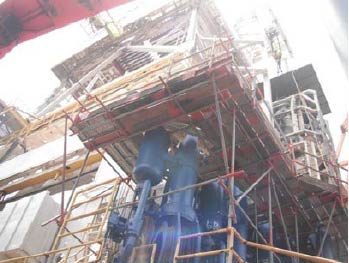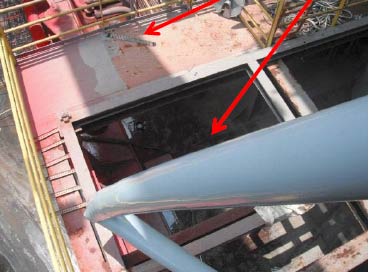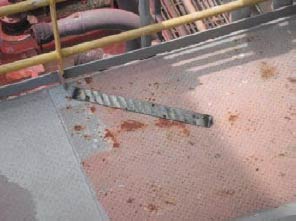High potential near-miss: Dropped object
A member has reported an incident in which a piece of angle bar fell 11m to the deck. The incident occurred when shipyard workers and third party contractors were in the process of removing a tensioner platform. It was mistakenly assumed that contractors had completed the cutting of the tensioner platform, as all barricade tape directly under the cut tensioner platform had been removed.
Workers were rigging the tensioner platform to be lifted out when they noticed a piece of angle bar that had not been cut, hence, preventing the platform from being lifted. A worker was deployed to cut the angle bar. He cut the top side of the angle bar before he passed the cutting torch to another person to cut the bottom part of the angle bar because it was beyond his reach. This second person then cut off the angle bar and placed it on the scaffold before returning to his original task. As he did so, he unwittingly kicked the angle bar off the scaffolding, and it fell to the deck below.
Four members of the crew were on the deck when the piece of angle bar fell from scaffold platform above and landed next to them, approximately 1.5m away. Had the piece of angle bar struck one or more persons in that group, it could have caused severe or fatal injuries.
An immediate safety stand down was held for all personnel involved.



Our member found that the root causes of the incident were as follows:
- One of the workers doing the cutting was not qualified to do this task;
- The unqualified worker doing the cutting did not remove or secure the angle bar from the scaffold;
- There was no barricading tape found below the scaffold platform.
Our member took the following corrective actions:
- All loose materials should be removed from all high level working platforms. If this is not possible, all materials must be relocated away from the edge of platform and should be properly secured;
- All areas underneath where work is taking place at height should be barriered off with hazard tape when overhead work is in progress, and should remain until after the overhead work is completed;
- A guard worker may be posted outside the danger zone to prevent access to the hazardous dropped object zone;
- Only properly trained and competent workers should be allowed to carry out the work;
- Before work at height starts when the vessel is in the shipyard, appropriate inspection of the worksite should take place by qualified shipyard personnel.
Members’ attention is drawn to the following IMCA material which may be of assistance:
- Guidelines for lifting operations
- Lifting equipment (pocket card)
- Working at height (pocket card)
- Avoiding dropped objects (poster)
- Avoiding dropped objects (pocket card)
Safety Event
Published: 14 November 2012
Download: IMCA SF 12/12
IMCA Safety Flashes
Submit a Report
IMCA Safety Flashes summarise key safety matters and incidents, allowing lessons to be more easily learnt for the benefit of all. The effectiveness of the IMCA Safety Flash system depends on Members sharing information and so avoiding repeat incidents. Please consider adding safetyreports@imca-int.com to your internal distribution list for safety alerts or manually submitting information on incidents you consider may be relevant. All information is anonymised or sanitised, as appropriate.
IMCA’s store terms and conditions (https://www.imca-int.com/legal-notices/terms/) apply to all downloads from IMCA’s website, including this document.
IMCA makes every effort to ensure the accuracy and reliability of the data contained in the documents it publishes, but IMCA shall not be liable for any guidance and/or recommendation and/or statement herein contained. The information contained in this document does not fulfil or replace any individual’s or Member's legal, regulatory or other duties or obligations in respect of their operations. Individuals and Members remain solely responsible for the safe, lawful and proper conduct of their operations.
